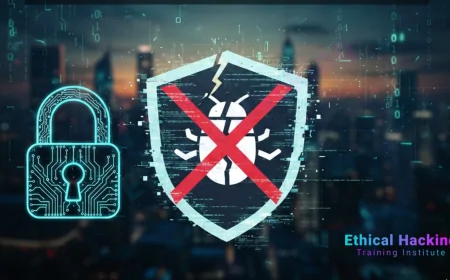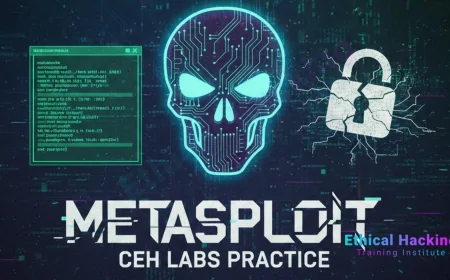Summer Training in Ethical Hacking at Pune | Learn Cybersecurity Skills in 2025
Looking for the best summer training in ethical hacking at Pune? Learn real-world cybersecurity skills, tools, and techniques with hands-on practical labs. Ideal for students and professionals aiming to boost their career in ethical hacking and cybersecurity in 2025. Flexible, beginner-friendly, and career-focused training modules.

In today's digital era, cybersecurity has become a paramount concern for organizations worldwide. With the increasing reliance on technology, the demand for skilled ethical hackers is on the rise. Pune, known as a prominent IT hub in India, offers a plethora of opportunities for aspiring cybersecurity professionals. This guide delves into the nuances of summer training in ethical hacking in Pune, highlighting its significance, curriculum, career prospects, and more.
Understanding Ethical Hacking
Ethical hacking involves authorized attempts to gain unauthorized access to a system, application, or data. The objective is to identify vulnerabilities and fix them before malicious hackers can exploit them. Ethical hackers play a crucial role in strengthening an organization's security posture by proactively identifying and addressing potential threats.
Why Choose Pune for Ethical Hacking Training?
Pune has emerged as a significant IT and educational hub in India. The city boasts a robust infrastructure, a plethora of IT companies, and a conducive environment for learning. Choosing Pune for ethical hacking training offers several advantages.
-
Access to Industry Experts: Pune houses numerous IT professionals and experts who provide valuable insights and mentorship.
-
Diverse Learning Opportunities: The city offers a range of training programs catering to different skill levels and interests.
-
Networking Prospects: Being an IT hub, Pune provides ample opportunities to connect with professionals and peers in the cybersecurity domain.
Structure of Summer Training Programs
Summer training programs in ethical hacking are typically structured to provide a comprehensive understanding of cybersecurity concepts. These programs often span 6-8 weeks and encompass:
-
Theoretical Sessions: Covering fundamental concepts of networking, security protocols, and ethical hacking methodologies.
-
Practical Labs: Hands-on sessions using tools like Kali Linux, Metasploit, and Wireshark to simulate real-world scenarios.
-
Live Projects: Working on real-time projects to apply learned concepts and gain practical experience.
-
Assessments: Regular evaluations to monitor progress and reinforce learning.
Core Modules Covered
A comprehensive ethical hacking training program typically includes the following modules:
-
Introduction to Ethical Hacking: Understanding the basics and significance of ethical hacking.
-
Footprinting and Reconnaissance: Gathering information about targets using various tools and techniques.
-
Scanning Networks: Identifying active devices, open ports, and services on a network.
-
Enumeration: Extracting detailed information about network resources.
-
System Hacking: Learning about password cracking, privilege escalation, and other system-level attacks.
-
Malware Threats: Studying different types of malware and their impact.
-
Sniffing: Capturing and analyzing network traffic.
-
Social Engineering: Understanding human-based attacks and how to mitigate them.
-
Denial-of-Service (DoS) Attacks: Learning about DoS and DDoS attacks and their prevention.
-
Session Hijacking: Understanding session management vulnerabilities.
-
Hacking Web Servers and Applications: Identifying and exploiting vulnerabilities in web applications.
-
SQL Injection: Understanding database vulnerabilities and their exploitation.
-
Wireless Network Hacking: Exploring vulnerabilities in wireless networks.
-
Evading IDS, Firewalls, and Honeypots: Learning techniques to bypass security mechanisms.
-
Cloud Computing: Understanding security challenges in cloud environments.
-
Cryptography: Studying encryption and decryption techniques.
Tools and Technologies
During the training, participants gain hands-on experience with various tools, including:
-
Kali Linux: A Debian-based Linux distribution used for penetration testing.
-
Metasploit Framework: A tool for developing and executing exploit code.
-
Nmap: A network scanning tool.
-
Wireshark: A network protocol analyzer.
-
Burp Suite: A web vulnerability scanner.
-
John the Ripper: A password cracking tool.
-
Aircrack-ng: A suite of tools for assessing Wi-Fi network security.
Certifications and Career Prospects
Upon successful completion of the training, participants often receive certifications that bolster their resumes. These certifications validate the skills acquired and enhance employability.
Career Opportunities:
-
Penetration Tester: Conducting authorized simulated attacks on systems.
-
Security Analyst: Monitoring and analyzing security systems.
-
Network Security Engineer: Designing and implementing secure network solutions.
-
Security Consultant: Advising organizations on best security practices.
-
Incident Responder: Addressing and managing security breaches.
Benefits of Summer Training
-
Skill Enhancement: Gaining practical skills that are directly applicable in the industry.
-
Industry Exposure: Understanding real-world challenges and solutions.
-
Networking: Connecting with professionals and peers in the field.
-
Career Advancement: Enhancing employability and opening doors to various job opportunities.
Eligibility Criteria
Summer training programs in ethical hacking are suitable for:
-
Students: Pursuing degrees in IT, Computer Science, or related fields.
-
Professionals: Looking to upskill or transition into cybersecurity roles.
-
Enthusiasts: Individuals passionate about cybersecurity and ethical hacking.
Preparing for the Training
To make the most of the training:
-
Basic Knowledge: Familiarize yourself with networking concepts and operating systems.
-
Programming Skills: Understanding languages like Python or Java can be beneficial.
-
Stay Updated: Keep abreast of the latest trends and threats in cybersecurity.
FAQ's
1. What is summer training in ethical hacking?
Summer training in ethical hacking is a short-term, intensive program designed to teach students and professionals how to identify and fix cybersecurity vulnerabilities. Conducted in Pune, it includes hands-on labs, real-world simulations, and modules aligned with industry practices, making it ideal for a fast-paced learning experience.
2. Who should attend summer ethical hacking training in Pune?
This training is ideal for B.Tech, BCA, MCA students, IT professionals, and cybersecurity enthusiasts who want to gain practical skills in ethical hacking. Pune's tech-driven environment and expert trainers make it an ideal city for learners aiming to build a future in cybersecurity.
3. What are the benefits of summer training in ethical hacking?
Key benefits include hands-on skills in penetration testing, exposure to tools like Kali Linux and Wireshark, industry-recognized certification, and improved job readiness. Summer training in Pune also helps students build connections and enhance their resumes with practical cybersecurity experience.
4. How long does ethical hacking summer training last in Pune?
Typically, summer training programs in Pune range from 4 to 8 weeks. These programs are intensive and structured to provide in-depth learning in a short period, covering both theoretical and practical aspects of ethical hacking.
5. What topics are covered in summer ethical hacking training?
Topics include network scanning, penetration testing, system hacking, web application security, malware analysis, and wireless network attacks. Pune-based training programs often focus on hands-on labs to build real-world hacking and defense skills.
6. Do I need prior knowledge to enroll in this training?
Basic knowledge of computers, networking, and operating systems is helpful but not mandatory. Most Pune training programs are beginner-friendly and start with foundational cybersecurity concepts, gradually moving to advanced ethical hacking techniques.
7. Is certification included in the summer training?
Yes, most ethical hacking summer training programs in Pune offer a certificate of completion. This certification adds value to your resume and showcases your skills to potential employers or academic institutions.
8. What tools are taught in ethical hacking summer courses?
Popular tools include Kali Linux, Metasploit, Burp Suite, Nmap, Wireshark, John the Ripper, and Aircrack-ng. Training institutes in Pune provide real-time labs to help students use these tools effectively in ethical hacking scenarios.
9. Can this training help me get a job in cybersecurity?
Absolutely. Ethical hacking summer training boosts your employability by providing practical skills that companies actively seek. Pune's growing IT and cybersecurity sector increases your chances of landing internships or entry-level roles after training.
10. How is the job market for ethical hackers in Pune?
Pune is a leading IT and cybersecurity hub with high demand for ethical hackers. Completing summer training can open doors to roles like Security Analyst, Penetration Tester, or Network Security Engineer in Pune’s top companies.
11. Are there live projects in summer training programs?
Yes, many Pune-based ethical hacking training programs include live projects. These simulate real-world cyberattacks and teach how to detect, analyze, and prevent them, giving participants invaluable hands-on experience.
12. What is the fee for ethical hacking summer training in Pune?
Fees typically range from ₹5,000 to ₹20,000 depending on the institute, course duration, and additional offerings like certification or live project work. Many institutes also offer early bird discounts or student packages during summer.
13. Is online summer training in ethical hacking available in Pune?
Yes, many Pune-based training providers offer online summer training, with live classes, recorded sessions, virtual labs, and mentorship. It’s ideal for remote learners or those who want flexibility while gaining the same level of hands-on skills.
14. What certification will I receive after completing the training?
You typically receive a course completion certificate. Some training providers also prepare you for globally recognized certifications like CEH (Certified Ethical Hacker) or CompTIA Security+ if you wish to advance your credentials.
15. How can ethical hacking training help in higher education?
This training enhances your profile for admissions into advanced degree programs like M.Tech or international cybersecurity courses. It also gives you an edge in academic research or practical thesis work related to digital security.
16. Do summer ethical hacking courses include job placement support?
Some ethical hacking training institutes in Pune offer placement assistance, including resume building, interview prep, and access to company drives. While guaranteed placements may not be common, skilled candidates are often referred to hiring partners.
17. What’s the difference between ethical hacking and penetration testing?
Ethical hacking is a broad practice involving various security assessments. Penetration testing is a specialized form of ethical hacking focused solely on exploiting vulnerabilities. Most summer training programs in Pune teach both areas with practical demonstrations.
18. Can school students join ethical hacking summer training?
Generally, ethical hacking summer courses are designed for college-level students or above. However, tech-savvy school students with a strong interest in cybersecurity may be allowed to join beginner-level batches after assessment by the training provider.
19. Will I learn to hack websites and networks legally?
Yes. Ethical hacking training in Pune focuses on legal and authorized hacking techniques. You’ll learn how to test systems for vulnerabilities in compliance with laws and ethical guidelines, simulating attack scenarios in controlled lab environments.
20. What career paths can I pursue after ethical hacking training?
Career options include Ethical Hacker, Security Analyst, SOC Analyst, Pen Tester, Malware Analyst, and Cybersecurity Consultant. Summer training gives you a strong foundation, making it easier to pursue internships, certifications, or full-time roles in Pune or beyond.
Securing Your Future in Ethical Hacking
Embarking on a summer training program in ethical hacking in Pune is a strategic move for anyone aspiring to build a career in cybersecurity. The city's vibrant IT ecosystem, combined with comprehensive training programs, offers an ideal environment for learning and growth. By acquiring hands-on experience, industry-relevant skills, and recognized certifications, participants can position themselves as valuable assets in the ever-evolving world of cybersecurity.
What's Your Reaction?
 Like
0
Like
0
 Dislike
0
Dislike
0
 Love
0
Love
0
 Funny
0
Funny
0
 Angry
0
Angry
0
 Sad
0
Sad
0
 Wow
0
Wow
0

















